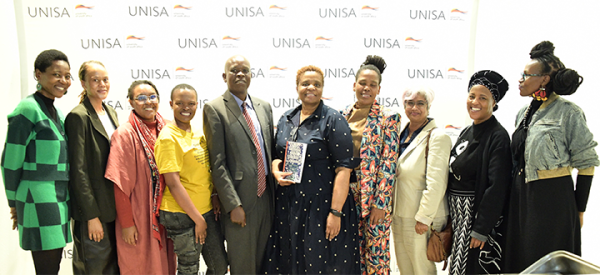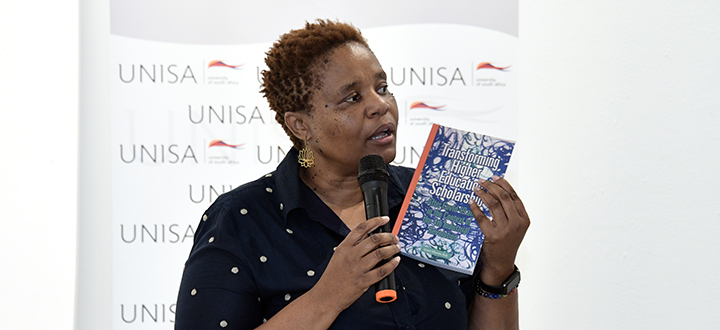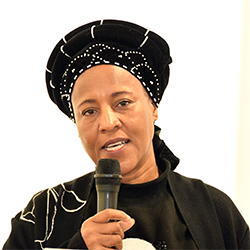News & Media
Launch of transformation book by Unisa challenges scholarship issues
Edited by Prof Grace Khunou from Unisa’s Department of Leadership and Transformation (DLT), a new book entitled Transforming higher education scholarship after COVID-19 and in the context of the 4th Industrial Revolution was launched on 19 February 2025 at the university's Art Gallery on the Muckleneuk campus.

The editor, discussant, facilitator and some of the authors at the book launch, from left: Prof Puleng Segalo (Chief Albert Luthuli Research Chair), Dr Tinyiko Chauke (Chief Albert Luthuli Research Chair), Siphokazi Tau (UJ), Bonny Ngakane (CEDU), Dr Benkosi Madlela (UJ), Prof Grace Khunou (DLT), Dr Nompumelo Zodwa Radebe (CHS), Prof Roshini Pillay (University of the Witwatersrand), Prof Edith Phaswana (TM-School) and Zandi Radebe (CHS)
The book launch was attended by academics from Unisa and various institutions of higher learning in South Africa who, among others, contributed to the chapters of the new book published by the University of Johannesburg (UJ) Press.
In this book, authors shone the light on various issues that have a direct impact on teaching and learning, such as the exploration of political intolerance, inequalities, corruption, fast-changing technologies and inequitable access to technological infrastructure.
4IR shape-shifting teaching and learning
The authors of the book are mostly from South African universities and tackle current transformative issues challenging higher education, especially the issue of technology after the COVID-19 pandemic. Three authors who contributed to the chapters of this book are Unisans from the College of Human Sciences (CHS) and a doctoral candidate studying in the College of Education (CEDU).
In her reflections about editing the book, Khunou, who recently launched another book, entitled Love in Jozi: The Black middle class, love and intimacy in Johannesburg, published in December 2024, shared with a cheerful audience that the artwork on the cover of this book was her painting. "This painting being published as part of this book gives me joy," said Khunou.

Prof Grace Khunou (Acting Executive Director: DLT)
Discussing an overview of the book, Prof Edith Phaswana, Acting Executive Dean of the Thabo Mbeki African School of Public and International Affairs (TM-School), highlighted the key transformation issues connected to the discourse of Africanisation and decolonisation, which she believes could have been included in the book title. She integrated contributions of various academics in the book to provide general commentary on a few chapters. She presented her views on humanism in the context of digitalisation as one of Unisa's transformation dimensions. She further said that the book chapters were approached through the lens of decolonial epistemic thought centred on African epistemologies, philosophies and methodologies.

Prof Edith Phaswana (Acting Executive Dean: TM-School)
Transformation agenda: unending impactful work
During her presentation, Phaswana said, "The book is fascinating as it focuses on 4IR and aftereffects of COVID-19 which changed the educational landscape completely." She explained, "30 years ago when we started with this work of transforming education, 4IR was not mentioned as one of the issues. Rather, they spoke about the demographics focusing on seeing Black bodies in academia." She added, "This work is relevant as we enter this decade, especially after three decades when the Higher Education Act was enacted in 1997." Moreover, she encouraged Unisa’s transformation office to continue leading this discourse of Africanisation and decolonisation, as the work has no end. "Many decolonisation schools set and led across the country were born out of this University. Write this history before it is taken away from Unisa," she emphasised.
On the relevancy perspective, Phaswana found the book important in academia at large, particularly for students, because they enter universities with different backgrounds which might not be familiar to the university. In Phaswana's view, "It is highly likely that your Africanness is erased in these spaces as universities expect you to take a particular form and identity." In addition, she mentioned that the book may be useful to researchers who are interested in transformation of higher education, and to lecturers as they can make an important contribution to how transformation is carried out at our universities to change our usual practices as educators, managers and administrators of institutions.
At the launch, UJ Press had an exhibition stand promoting the new book and Unisa Press showcased their diverse range of publications, including new releases in African studies primarily in the humanities and social sciences, which included Professor Segalo’s work.
Featuring lively African-centred discussions facilitated by a Political Sciences Lecturer, Zandi Radebe, from CHS, the book launch was a success and gave not only authors but also delegates on the floor an opportunity to share their experience of the book.
Click here to access the book: Transforming higher education scholarship after Covid-19 and in the context of the 4th Industrial Revolution | UJ Press
* By Lesego Chiloane, Marketing and Communication Specialist (acting),Unisa Department of Leadership and Transformation
** Photography by Shooheima Champion, Multimedia Centre
Publish date: 2025/02/28

 Unisa co-hosts G20 community outreach in the Eastern Cape
Unisa co-hosts G20 community outreach in the Eastern Cape
 Unisans gain membership of prestigious science academies
Unisans gain membership of prestigious science academies
 Advocating for disability transformation through servant leadership
Advocating for disability transformation through servant leadership
 Unisa Press continues to illuminate the publishing space
Unisa Press continues to illuminate the publishing space